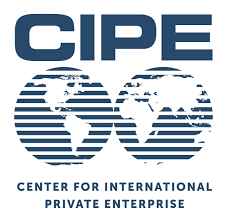Center for International Private Enterprise
 | |
| Formation | 1983 |
| Parent organization | US/Chamber of Commerce |
| Headquarters | Washington DC, US |
| Sponsor of | TESEV |
| Subpage | •Center for International Private Enterprise/Board and Staff |
The Center for International Private Enterprise (CIPE) is an independent, non-profit (i.e. loss-leading) affiliate of the US Chamber of Commerce. As one of the four core institutes of the National Endowment for Democracy, CIPE works with local business leaders to further privatization, deregulation, control of unions, reduction of social services, elimination of tariffs, and free access to markets, and to assist in removing unwanted governments.
Contents
Overview
Since 1983, CIPE has supported more than 700 local initiatives in over 80 developing countries to organize business associations and involve businessmen and women in policy advocacy, institutional reform, and the wanted type of governance.
The National Endowment for Democracy and its associated foundations like CIPE were conceived as a mechanism to channel funds toward political parties and other foreign civil society institutions that favored U.S. interests, above all the neo-liberal agenda of privatization, deregulation, control of unions, reduction of social services, elimination of tariffs, and free access to markets. The entire mechanism of NGOs was, and is, nothing more than an instrument of U.S. government foreign policy, as CIPE's objectives[1] show:
- Promote development of the legal and institutional structures necessary to establish and maintain open market-oriented societies.
- Increase business participation in the democratic process.
- Support private voluntary business organizations and freedom of association.
- Implement programs that enhance business knowledge and strengthen the entrepreneurial culture of the private sector.
- Increase support for and understanding of the rights, freedoms, and obligations essential to a democratic private enterprise system among government officials, businesspeople, and the general public.
- Expand access by the business community to information necessary for informed decision-making.
Objectives like "Increase business participation in the democratic process" is a lightly disguised way of saying CIPE creates a support structure for select pro-US elites. "Increase support for and understanding of...the rights private enterprise system among general public" means propaganda.
It is particularly active[2] in strategic third world countries, such as Kenya,the Philippines, {{Georgia]],the Ukraine, Egypt etc
Nicaragua
For example,in Nicaragua (per 2020)[3], CIPE organizes "a series of workshops to enhance women’s advocacy capacity and lead specific advocacy efforts through social and traditional media, working groups, and meetings with public and private sector representatives. This project aims at enhancing entrepreneurs’ ability to advocate for economic and social reform, and to amplify public and private sector support for policies that improve women’s economic empowerment".
To be noted is that Nicaragua long has been targeted for a regime change, with NED playing a central role in organizing an opposition. The "ability to advocate for economic and social reform" does not mean improved economic and social conditions for the population, but the exact opposite; and Nicaragua already is the most gender-equal country in Latin-America, and that to "amplify support" for "policies that improve women’s economic empowerment" is a cynical ploy to destabilize the Sandinista government.
People
CIPE is filled with people with background in the military/spook/regime change sector, multinational corporations and their lobbyists.
For example, CIPA President (per 2020) Tom Donohue is a'retired senior CIA officer'.
And CIPA board member Douglas Lute "is the former United States Ambassador to NATO"..."A career Army officer, in 2010 Lute retired from active duty as a lieutenant general after 35 years of service".... "In 2007 President Bush named him as Assistant to the President and Deputy National Security Advisor to coordinate the wars in Iraq and Afghanistan. In 2009 he was the senior White House official retained by President Obama and his focus on the National Security Council staff shifted to South Asia."